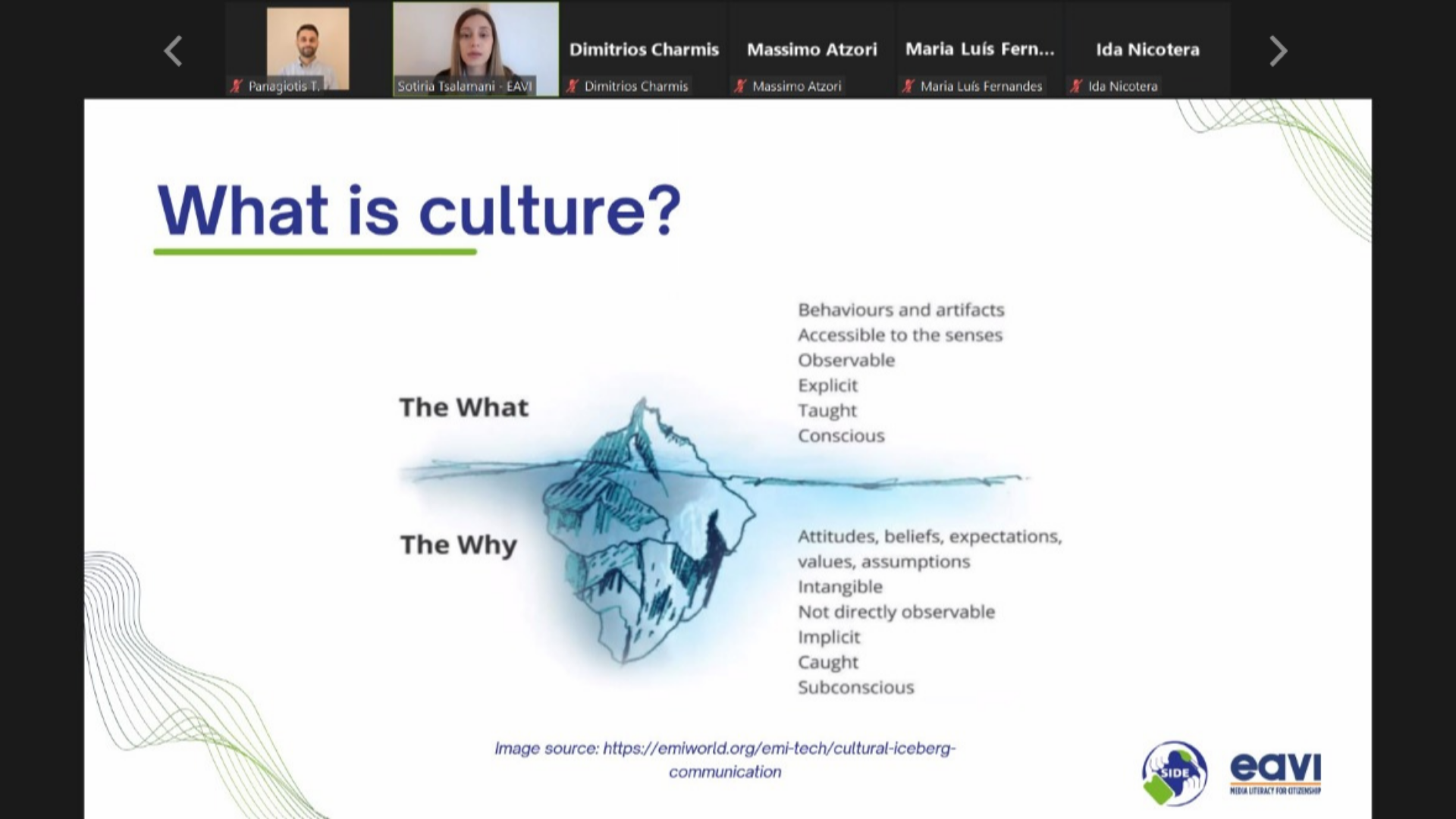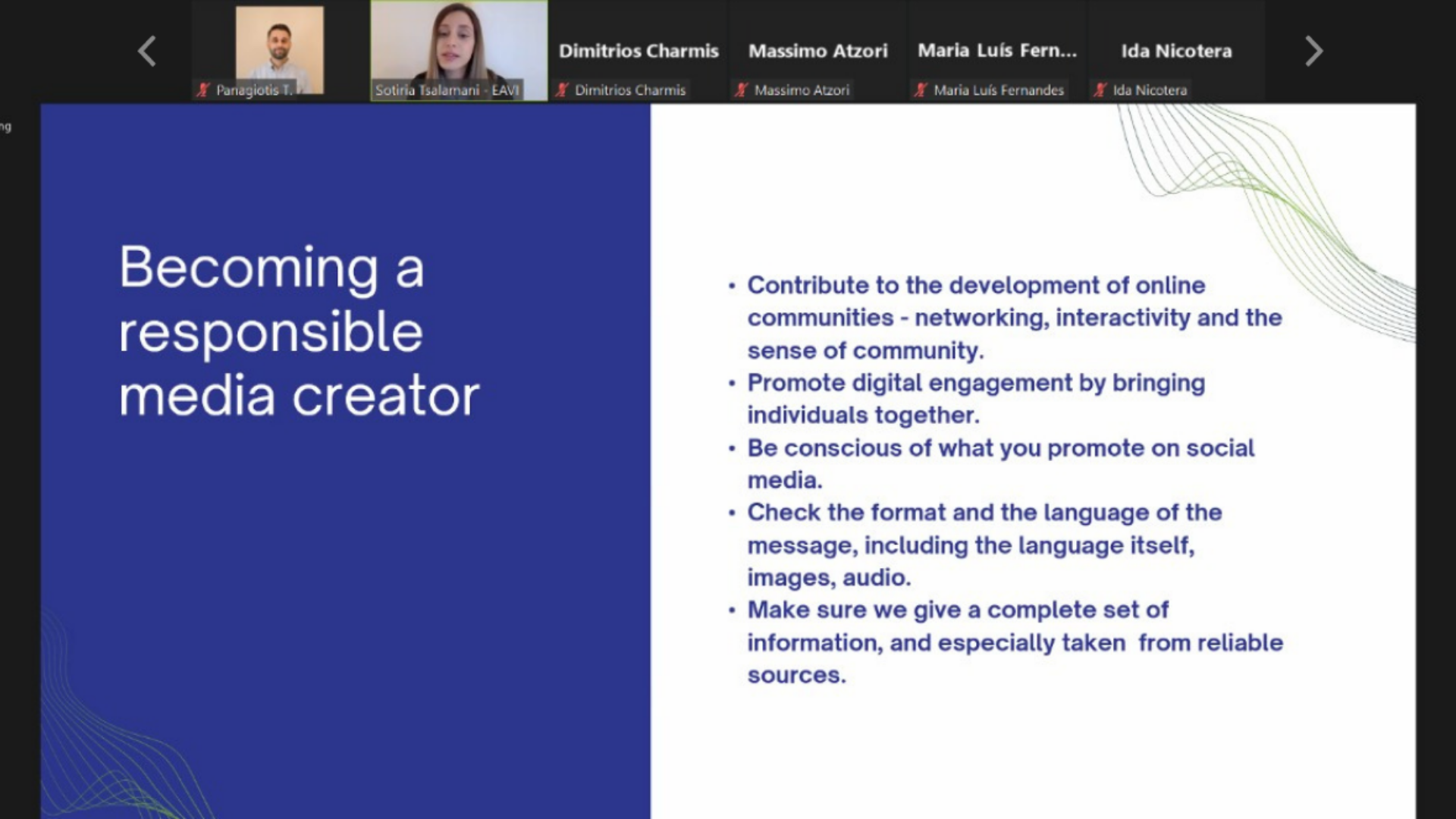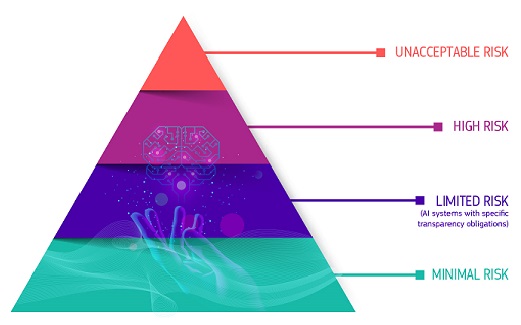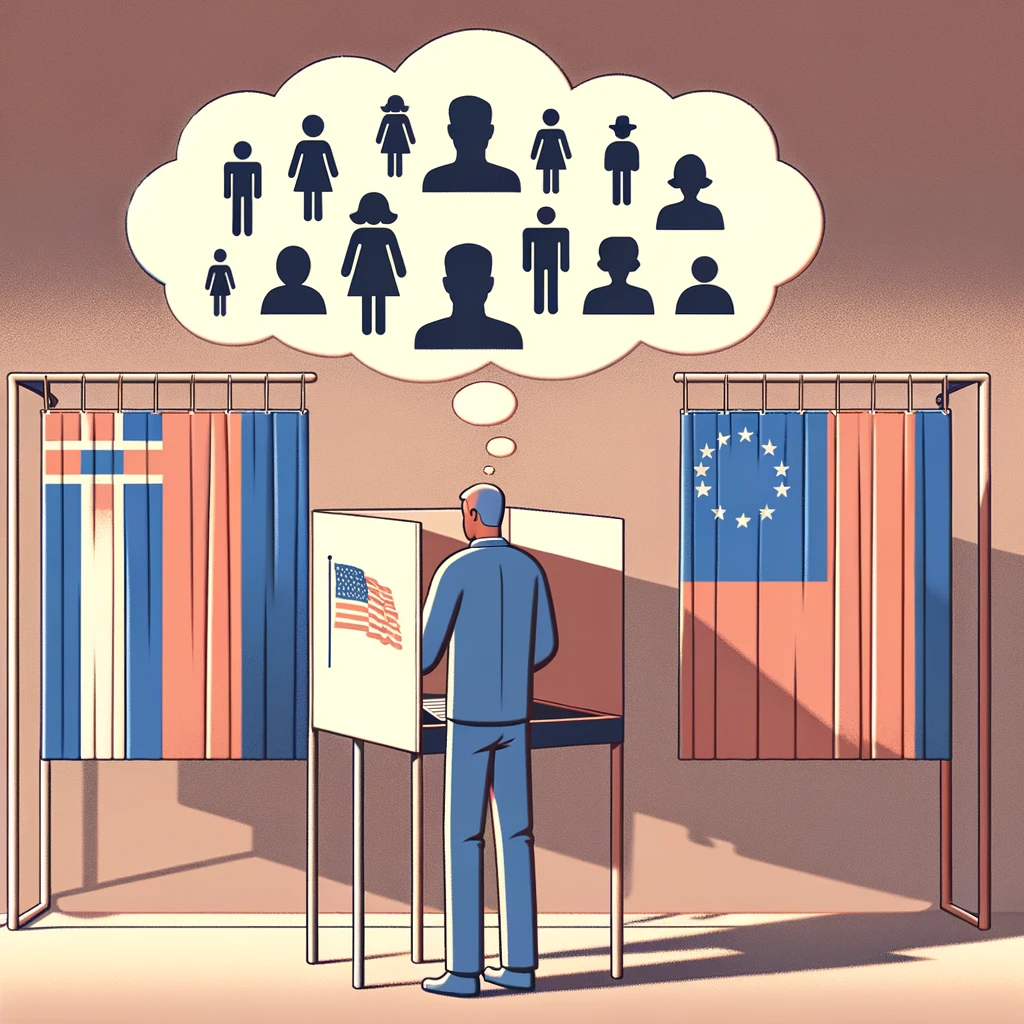EAVI recognises the importance of media literacy and citizenship at a European level with the goal to enable citizens to competently engage with media so that they can fully participate in democratic life. Our goals are ever more relevant as we increasingly become digital citizens faced with both the opportunities and challenges that this era brings.
In this context, EAVI conducted the first piloting for the Digital Culture MOOC of the SIDE project on the 22nd of March, 2022, with the aim to:
- Enhance participants’ current knowledge of digital culture;
- Teaching them new concepts and skills that they can apply to their work and everyday life;
- Provide them with an overview of the learning material of the SIDE MOOC and guarantee their participation in the MOOC.
The workshop was held online through ZOOM and lasted approximately 1 hour and 10 minutes.


The workshop was conducted with an audience of 20 young professionals (18-26) working in the art and culture field or aiming to follow a career in it. Moreover, individuals working in various organisations participated and exchanged ideas and concerns.
It consisted of interactive activities that allowed the participants to reflect on their needs, experiences and the knowledge they possess on digital culture and digital transformation. Moreover, they had the opportunity to learn more about the SIDE project and its objectives.
The workshop covered two of the SIDE MOOC Modules; a) Digital Culture Content and b) Digital Culture Promotion in Social Media and Beyond. Specifically, together with the participants, we explored in depth the units below:
- What is digital culture?
- How can we ensure our participation?
- What is the role of media literacy?
- What is the role of social media?
- How can we become responsible media creators?
In order to plan the piloting workshop, we had to consider the participants’ background and knowledge, the relevance of the material to their field, and their expectations.
The first part of the piloting was more theoretical, providing the participants with substantial knowledge about digital culture and its different elements. At the same time, they participated in activities where they were required to reflect on their knowledge and experiences and identify specific aspects of the Digital Culture. Based on that, we went into more detail on specific topics relevant to participants’ particular situations.
The second part consisted of the presentation of concrete tools that can be used by anyone to promote his/her work to a broader audience, as well as tips and suggestions on how someone can become a responsible media creator.
The process was well-received by the participants, and they showed great appreciation for the teaching and learning material.
EAVI recognises the importance of media literacy and citizenship at a European level with the goal to enable citizens to competently engage with media so that they can fully participate in democratic life. Our goals are ever more relevant as we increasingly become digital citizens faced with both the opportunities and challenges that this era brings.
In this context, EAVI conducted the first piloting for the Digital Culture MOOC of the SIDE project on the 22nd of March, 2022, with the aim to:
- Enhance participants’ current knowledge of digital culture;
- Teaching them new concepts and skills that they can apply to their work and everyday life;
- Provide them with an overview of the learning material of the SIDE MOOC and guarantee their participation in the MOOC.
The workshop was held online through ZOOM and lasted approximately 1 hour and 10 minutes.


The workshop was conducted with an audience of 20 young professionals (18-26) working in the art and culture field or aiming to follow a career in it. Moreover, individuals working in various organisations participated and exchanged ideas and concerns.
It consisted of interactive activities that allowed the participants to reflect on their needs, experiences and the knowledge they possess on digital culture and digital transformation. Moreover, they had the opportunity to learn more about the SIDE project and its objectives.
The workshop covered two of the SIDE MOOC Modules; a) Digital Culture Content and b) Digital Culture Promotion in Social Media and Beyond. Specifically, together with the participants, we explored in depth the units below:
- What is digital culture?
- How can we ensure our participation?
- What is the role of media literacy?
- What is the role of social media?
- How can we become responsible media creators?
In order to plan the piloting workshop, we had to consider the participants’ background and knowledge, the relevance of the material to their field, and their expectations.
The first part of the piloting was more theoretical, providing the participants with substantial knowledge about digital culture and its different elements. At the same time, they participated in activities where they were required to reflect on their knowledge and experiences and identify specific aspects of the Digital Culture. Based on that, we went into more detail on specific topics relevant to participants’ particular situations.
The second part consisted of the presentation of concrete tools that can be used by anyone to promote his/her work to a broader audience, as well as tips and suggestions on how someone can become a responsible media creator.
The process was well-received by the participants, and they showed great appreciation for the teaching and learning material.
EAVI recognises the importance of media literacy and citizenship at a European level with the goal to enable citizens to competently engage with media so that they can fully participate in democratic life. Our goals are ever more relevant as we increasingly become digital citizens faced with both the opportunities and challenges that this era brings.
In this context, EAVI conducted the first piloting for the Digital Culture MOOC of the SIDE project on the 22nd of March, 2022, with the aim to:
- Enhance participants’ current knowledge of digital culture;
- Teaching them new concepts and skills that they can apply to their work and everyday life;
- Provide them with an overview of the learning material of the SIDE MOOC and guarantee their participation in the MOOC.
The workshop was held online through ZOOM and lasted approximately 1 hour and 10 minutes.


The workshop was conducted with an audience of 20 young professionals (18-26) working in the art and culture field or aiming to follow a career in it. Moreover, individuals working in various organisations participated and exchanged ideas and concerns.
It consisted of interactive activities that allowed the participants to reflect on their needs, experiences and the knowledge they possess on digital culture and digital transformation. Moreover, they had the opportunity to learn more about the SIDE project and its objectives.
The workshop covered two of the SIDE MOOC Modules; a) Digital Culture Content and b) Digital Culture Promotion in Social Media and Beyond. Specifically, together with the participants, we explored in depth the units below:
- What is digital culture?
- How can we ensure our participation?
- What is the role of media literacy?
- What is the role of social media?
- How can we become responsible media creators?
In order to plan the piloting workshop, we had to consider the participants’ background and knowledge, the relevance of the material to their field, and their expectations.
The first part of the piloting was more theoretical, providing the participants with substantial knowledge about digital culture and its different elements. At the same time, they participated in activities where they were required to reflect on their knowledge and experiences and identify specific aspects of the Digital Culture. Based on that, we went into more detail on specific topics relevant to participants’ particular situations.
The second part consisted of the presentation of concrete tools that can be used by anyone to promote his/her work to a broader audience, as well as tips and suggestions on how someone can become a responsible media creator.
The process was well-received by the participants, and they showed great appreciation for the teaching and learning material.






















































































































































